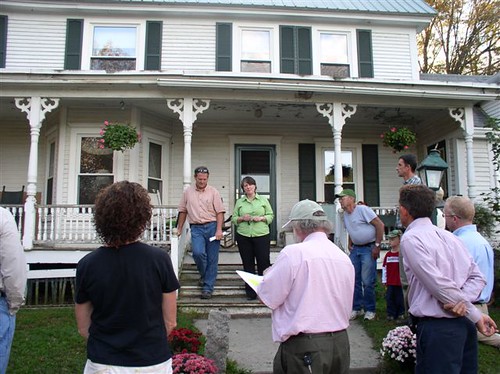Last week, we welcomed Agriculture Deputy Secretary Kathleen Merrigan to Vermont as she toured farms to see recovery efforts after Tropical Storm Irene.

Our first stop was the Wheeler Farm, a 100 acre 50-cow grass based farm just north of Wilmington, one of the hardest hit communities in the state. Visible water marks were higher than the historic flood of 1927 and hurricane of 1938. The group welcomed Deputy Secretary Merrigan on the porch of the historic farmhouse, which had just escaped the flood waters by a few inches. As we pulled onto the farm’s access road, a large grader and dump truck continued work to repair washed away segments.
Rob and Karen Wheeler explained how they were humbled by the outpouring of support from their neighbors to quickly clean up and bring back their large field. Rob also told the Deputy Secretary of his positive experiences and support for the local USDA staff. She spoke of the signs she saw in Wilmington that read “Courage” and “Thank you for your support,” and even one advertising “Floodstock,” a benefit concert for disaster relief. She remarked on the resilience of the Vermont farmers and of course, farmers as a group, and also spoke of the challenges ahead for USDA and its programs.
Our next stop was the Harlow Farm in Westminster, an 80 acre organic vegetable farm with a successful farm store and wholesale business. We were welcomed by owner-operator Paul Harlow who is well respected and widely known for his extensive crop knowledge.
About 30 vegetable and dairy producers came to speak with the Deputy, along with Vermont Agriculture Secretary Chuck Ross who had been assessing crop damage and meeting with farmers in another county. Paul Harlow explained how over 30 acres of his vegetables were flooded by the Connecticut River. They remained under water for several days and Paul was forced to harrow under all damaged crops. Deputy Secretary Merrigan emphasized the special place Vermont agriculture has in the national eye: Local food, strong markets and strong community bonds are evident and to be commended, she said. The Deputy welcomed all conversation topics from the group, offered encouragement to work through USDA paperwork and talked of the approaching Farm Bill.
Our final stop of the day in Windham County was the six-generation Robb Family Farm on Ames Hill Road just west of Brattleboro. The family welcomed the group and once again we gathered around the porch of a historic Vermont farmhouse. The Robb Family Farm has been a dairy farm and maple sugaring operation for 100 years. They now produce corn and hay for their animals on approximately 180 acres. They recently sold the dairy cows and transitioned to beef. They added to their 2,000 maple taps to support their successful online store and mail order business, which sells maple syrup made on the farm.
Charlie Robb, Jr., who currently serves as Chair of the Windham County FSA Committee, explained how a hay field and a corn field were flooded by the Whetstone Brook from Tropical Storm Irene. This same brook also caused severe damage to Route 9, the main highway between Brattleboro and the west side of the county. Deputy Secretary Merrigan remarked on the farmers’ resilience and disaster clean-up progress. She also noted and complimented Vermont’s agricultural leadership. Area farmers encouraged the Deputy to support a strong conservation budget, especially mentioning the impacts of invasive species in southern Vermont.
Our visit ended with many handshakes and Deputy Secretary Merrigan posing for photos with our hosts and their neighbors. Area farmers told us how much they appreciated her concern for them and the efforts of the local USDA “boots on the ground.”
